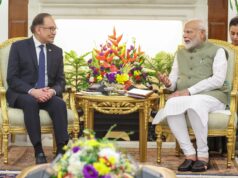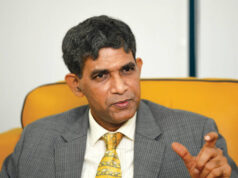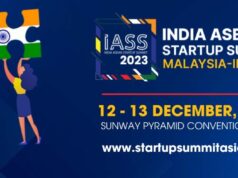 Kuala Lumpur, March 31 – “Make in India” – one of the initiatives announced by Prime Minister Narendra Modi has succeeded in generating interest among multi-nationals and investors all over the world. In a press statement released in Kuala Lumpur, the High Commission of India, has outlined the motives behind the initiative and the efforts taken by the Indian government to make it a success.
Kuala Lumpur, March 31 – “Make in India” – one of the initiatives announced by Prime Minister Narendra Modi has succeeded in generating interest among multi-nationals and investors all over the world. In a press statement released in Kuala Lumpur, the High Commission of India, has outlined the motives behind the initiative and the efforts taken by the Indian government to make it a success.
The Prime Minister of India Shri Narendra Modi launched ‘Make in India’ global initiative on 25th September, 2014 from Vigyan Bhawan. The objective of the initiative is to unleash the untapped power of India’s strategic strengths.
The three D’s that work in favour of India; democracy, demand and demography, are to be harnessed in a focused manner to ensure India’s continued movement on the path of growth. ‘Make in India’ initiative intends to invite both domestic and foreign investors to invest in India. The initiative was simultaneously launched in the Capital of all states and in several Indian Embassies/High Commissions including in Kuala Lumpur.
India’s National Manufacturing Policy, 2011 was announced with an objective of enhancing the share of manufacturing in GDP to 25% by 2022 and creating 100 million jobs. However, the performance of manufacturing witnessed a downward trend with growth rates of 1.1 % and -0.7% during 2012-13 and 2013-14 respectively.
There was a need to give a significant impetus to manufacturing activities through boosting sentiments and creation of conducive environment to promote entrepreneurship.
The ‘Make in India” initiative is based on four pillars, which have been identified to give boost to entrepreneurship in India, not only in manufacturing but also other sectors. The four pillars are:
(i) New Processes:
‘Make in India’ recognizes ‘ease of doing business’ as the single most important factor to promote entrepreneurship. A number of initiatives have already been undertaken to ease business environment. The aim is to de-license and de-regulate the industry during the entire life cycle of a business.
(ii) New Infrastructure:
Availability of modern and facilitating infrastructure is a very important requirement for the growth of industry. Government intends to develop industrial corridors and smart cities to provide infrastructure based on state-of-the-art technology with modern high-speed communication and integrated logistic arrangements. Existing infrastructure to be strengthened through upgradation of infrastructure in industrial clusters. Innovation and research activities are supported through fast paced registration system and accordingly infrastructure of IPR registration set-up has been upgraded. The requirement of skills for industry are to be identified and accordingly development of workforce to be taken up.
(iii) New Sectors:
‘Make in India’ has identified 25 sectors in manufacturing, infrastructure and service activities and detailed information is being shared through interactive web-portal and professionally developed brochures. FDI has been opened up in Defence Production, Construction and Railway infrastructure in a big way.
(iv) New Mindset:
Industry is accustomed to see Government as a regulator. ‘Make in India’ intends to change this by bringing a paradigm shift in how Government interacts with industry. The Government will partner industry in economic development of the country. The approach will be that of a facilitator and not regulator.
Investor Facilitation Cell
With these in mind, an Investor Facilitation Cell has been created in ‘Invest India’ to assist, guide, handhold and facilitate investors during the various phases of business life cycle. This Cell will provide necessary information on vast range of subjects; such as, policies of the Ministries and State Governments, various incentive schemes and opportunities available, to make it easy for the investors to make necessary investment decision.
Information on 25 sectors has been put up on ‘Make in India’s web portal (http://www.makeinindia.com) along with details of FDI Policy, National Manufacturing Policy, Intellectual Property Rights and Delhi Mumbai Industrial Corridor and other National Industrial Corridors. Investors can use this portal to search information on specific sectors and topics.
An automated response system presents related FAQs through identification of key words. Further, this portal provides an opportunity to raise specific queries to Investor Facilitation Cell. Till 26th March, 2015 Investor Facilitation Cell has received 8,298 specific queries. With a mandate to reply within 72 hours Investor Facilitation Cell has been efficiently clearing doubts, facilitating meetings and visits on these queries and handholding investors wherever required.
“Ease of doing business”
Another important area where Government has worked tirelessly is ‘Ease of Doing Business’. With determination to improve India’s rank in World Bank Group’s Doing Business Report, a number of landmark reforms have been undertaken. A bill has been introduced to remove the requirement of minimum paid up capital and common seal for companies. The number of documents required for import and export of goods has been reduced to three.
Process of providing electric connection is being streamlined to drastically reduce the time required. A number of items have been taken off the licensing requirement. Processes have been made online and real-time. A single window eBiz portal is being developed and is already working with 14 Central Government services. The list is long and commendable.
A number of measures have been proposed in the Budget 2015-16 to support ‘Make in India’ initiative. Key highlights for proposals aimed towards ‘Make in India’ initiative in 2015-16 Budget are:
The corporate tax rate for companies registered in India to go down from 30% to 25% of net profits in a phased manner over the next four years starting from FY 16-17. An expert committee to examine the possibility and prepare a draft legislation where the need for multiple prior permission can be replaced by a pre-existing regulatory mechanism. Goods and Services Tax proposed to be implemented from April 01, 2016. Special scheme for skilling youth with US$ 237.5 million. 1 million youth to be skilled in next 3 years
Withholding tax rates for non-residents from royalty/fees for technical services reduced from 25% to 10%.
Micro Unit Development Refinance Agency (MUDRA) Bank with corpus of US$ 3.15 billion. Foreign investment allowed in Alternate Investment Funds. Wealth tax abolished.
‘Make in India’ initiative has been extremely successful in generating interest in India. Government of India has been working to make this programme a success in partnership with the State Governments. The Prime Minister of India has promised to make India the easiest place to do business in world. India still has a large canvass cut out to work on and fulfil promises made to Indian citizens and to the world.











